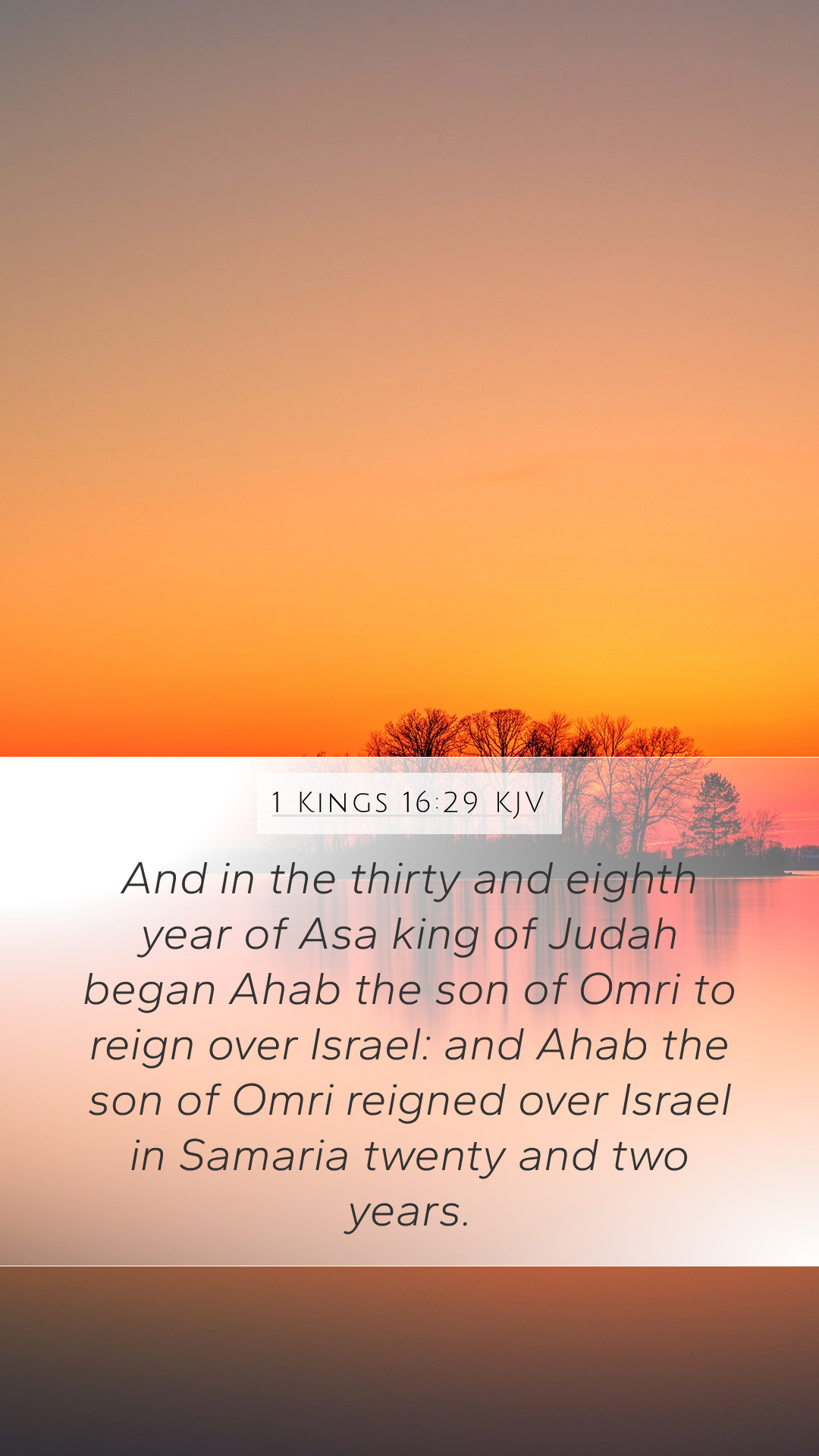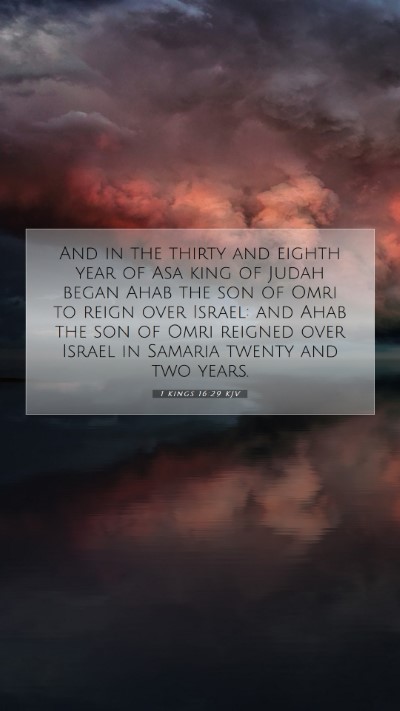Understanding 1 Kings 16:29
Bible Verse: 1 Kings 16:29 - "In the thirty-eighth year of Asa king of Judah began Ahab the son of Omri to reign over Israel: and Ahab the son of Omri reigned over Israel in Samaria twenty and two years."
Verse Context
This verse introduces Ahab, the son of Omri, as a significant figure in the history of Israel during a period marked by political intrigue and moral decline. Understanding this context is crucial for grasping the implications of Ahab's reign.
Bible Verse Commentary
Various public domain commentaries provide insights into the meaning of 1 Kings 16:29. Below are the combined interpretations based on the works of Matthew Henry, Albert Barnes, and Adam Clarke.
Overview of Ahab's Reign
- Matthew Henry: Henry notes Ahab's ascent as a critical moment in Israel's history. He emphasizes that Ahab was one of the most notorious kings, often linked with idolatry and turning away from God.
- Albert Barnes: Barnes highlights the historical placement of Ahab's reign, marking its chronological detail as significant for understanding the continuity of Israel's leadership.
- Adam Clarke: Clarke discusses the implications of Ahab's reign in terms of the overall spiritual condition of Israel, suggesting that his leadership led to a decline in moral standards among the people.
Historical Context
The thirty-eighth year of Asa's reign in Judah provides a chronological anchor that helps in understanding the broader political landscape. Ahab's reign corresponded with a tumultuous period in the Northern Kingdom of Israel, overshadowed by the practices of idolatry influenced by his marriage to Jezebel, a Phoenician princess.
Political and Spiritual Implications
- Moral Implications: Henry emphasizes the moral decline associated with Ahab, indicating that his actions had far-reaching effects on Israel's spiritual condition, leading to a greater separation from Yahweh.
- Worship Practices: The introduction of Baal worship and other foreign deities escalated under Ahab, which Barnes points out as a pivotal change in the religious landscape of Israel.
- Symbol of Rebellion: Clarke refers to Ahab as a symbol of rebellion against God's covenant. His reign epitomizes how leadership decisions can profoundly impact the people's faith.
Biblical Exegesis
Exegesis of this verse involves understanding both its literary and theological dimensions. Ahab's long 22-year reign is not only a historical note but a theological warning against the consequences of forsaking divine guidance.
- Literary Analysis: The verse sets the stage for subsequent events in Israel's history, foreshadowing Ahab's conflicts with the prophet Elijah, which highlight the struggle between true worship and idolatry.
- Theological Implications: This passage serves as a commentary on the nature of covenant relationship; Ahab’s rule represents a stark contrast to covenant faithfulness.
Applying 1 Kings 16:29 to Daily Life
In applying this verse, believers are encouraged to reflect on the impact of leadership—both personal and communal—on faith and moral integrity. Ahab’s reign offers a cautionary tale about the results of disobedience to God's commandments.
Related Bible Cross References
- 1 Kings 17:1: The beginning of Elijah's ministry, emphasizing the confrontation with Ahab.
- 2 Kings 9:22: Reflects the ongoing conflict between Ahab's line and the prophets of Yahweh.
- 1 Kings 18:21: Ahab's challenge to the people regarding worshipping Baal versus Yahweh.
Conclusion
1 Kings 16:29 serves as an essential verse in the historical narrative of Israel, shedding light on the transformational challenges faced during Ahab's reign. Through this commentary, readers can gain deeper bible verse understanding and apply these bible study insights to their own lives.
Whether you're in a bible study group or exploring online bible study, this exploration of Ahab's reign invites deeper dialogue about the impact of leadership on faith and morality.


